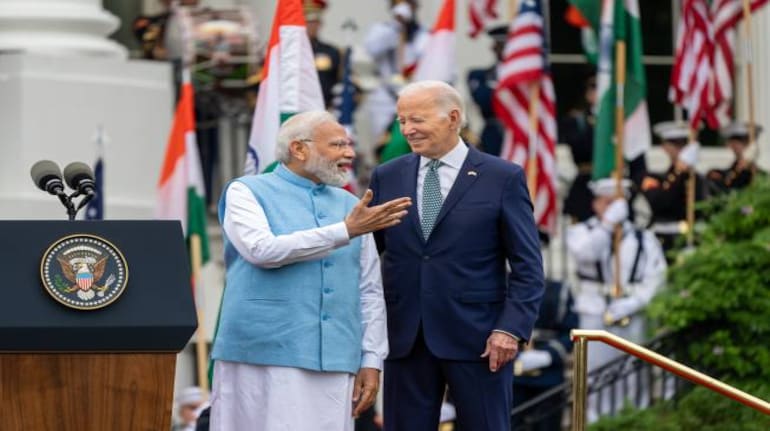



US President Joe Biden and Indian Prime Minister Narendra Modi have acknowledged the risks associated with artificial intelligence, including generative AI, and have committed to mitigating discrimination and bias associated with the technology, a White House statement said on June 22.
The concerns have been flagged at a time when India is looking to regulate artificial intelligence through its upcoming Digital India Bill and governments scramble to address various issues arising out of AI, the latest tech frontier.
"Both President Biden and Prime Minister Modi acknowledge the profound opportunities and significant risks associated with AI," the White House statement on Day 2 of Modi's first state visit to the US said.
"Accordingly, they committed to develop joint and international collaboration on trustworthy and responsible AI, including generative AI, to advance AI education and workforce initiatives, promote commercial opportunities, and mitigate against discrimination and bias."
The biggest risks associated with generative AI include hallucinations in large language models (LLMs), an error that occurs when the model generates outputs that are based on false assumptions.
Generative AI can also be used to create deepfakes, exploit data privacy, create advanced malwares, apart from creating copyright issues.
A few days ago, Sam Altman, the CEO of the popular ChatGPT-maker OpenAI, met Modi in Delhi and talked about the need for global regulation of AI.
The US has also supported India’s leadership as the chair of the Global Partnership on AI, an initiative to promote responsible artificial intelligence use that respects human rights and democratic values.
The two countries signed a raft of agreements ranging from defence, technology, education to space travel during the day.
Digital Public Infrastructure
The joint statement also recognised the potential of Digital Public Infrastructure (DPI) for enabling open and inclusive digital economies.
"In this regard, the United States and India will explore how to partner together and align our efforts to advance the development and deployment of robust DPIs, including appropriate safeguards to protect, privacy, data security and intellectual property," the statement said.
India has been partnering with several countries for the adoption of country's DPI infrastructure like Aadhaar and United Payments Interface. India signed several memorandums of understanding during the recent Global DPI Summit in Pune.
Cybersecurity
The White House statement said that Biden and Modi reaffirmed their countries’ commitment to continue cooperation on a range of cybersecurity issues, including preventing and responding to cyber threats, promoting cybersecurity education and awareness and measures to build cyber infrastructure.
India critical infrastructure and government officials have been at the receiving end of a string of cyber attacks. There were 19 ransomware attacks on Indian government organisations in 2022.
Not just cyberattacks, concerns have also been growing over the misuse of information and communication technologies and drones for terrorism.
"They noted with concern the increasing global use of unmanned aerial vehicles (UAVs), drones and information and communication technologies for terrorist purposes and reaffirmed the importance of working together to combat such misuse," the statement said.
The two countries welcomed 35 innovative joint research collaborations in emerging technologies including in cyber-physical systems and on securing cyberspace.
Discover the latest Business News, Sensex, and Nifty updates. Obtain Personal Finance insights, tax queries, and expert opinions on Moneycontrol or download the Moneycontrol App to stay updated!
Find the best of Al News in one place, specially curated for you every weekend.
Stay on top of the latest tech trends and biggest startup news.